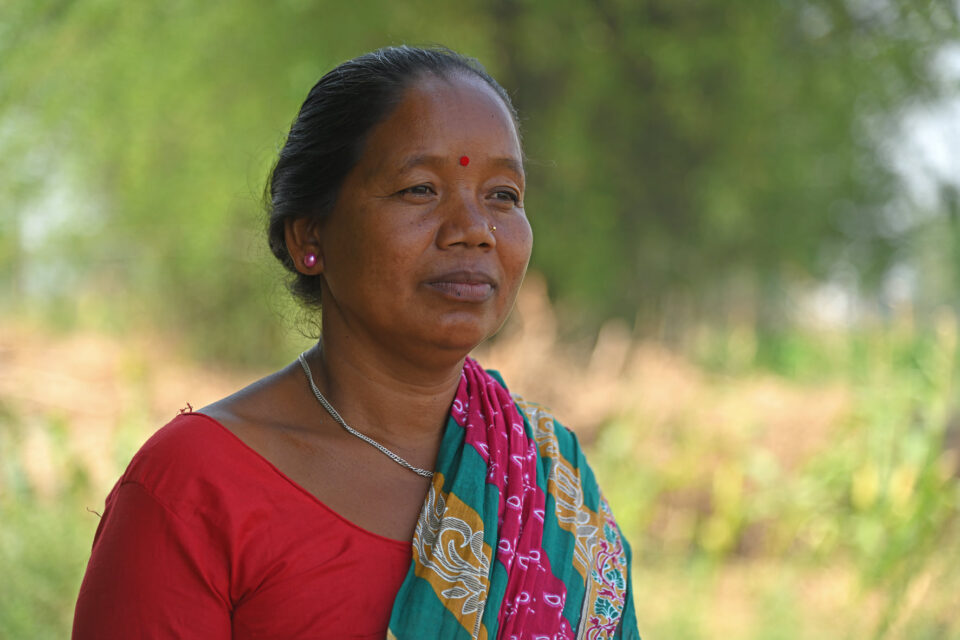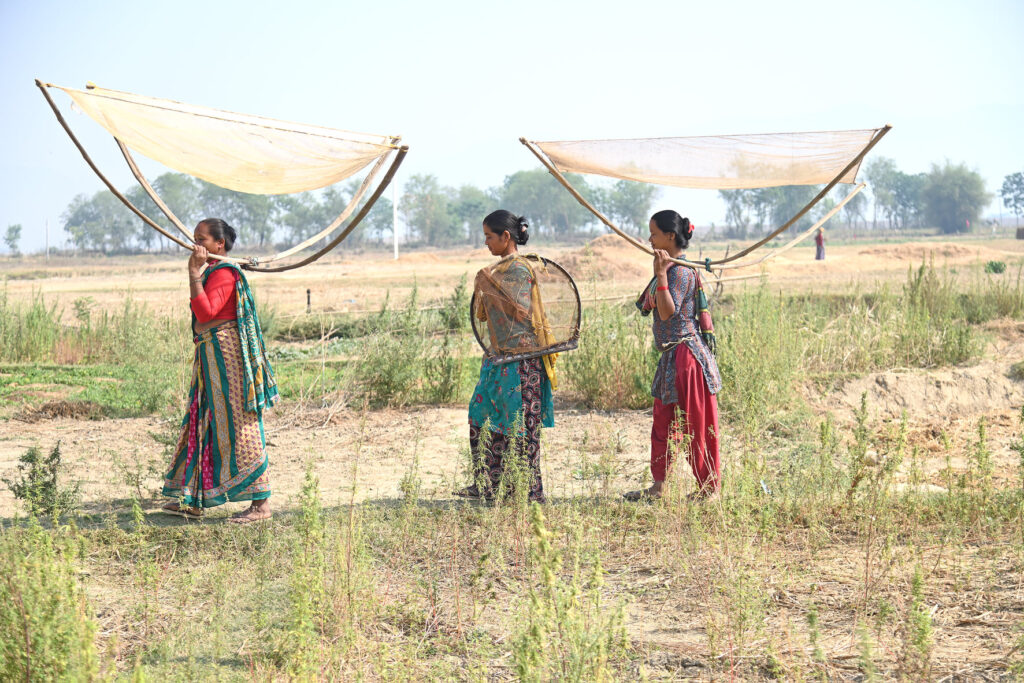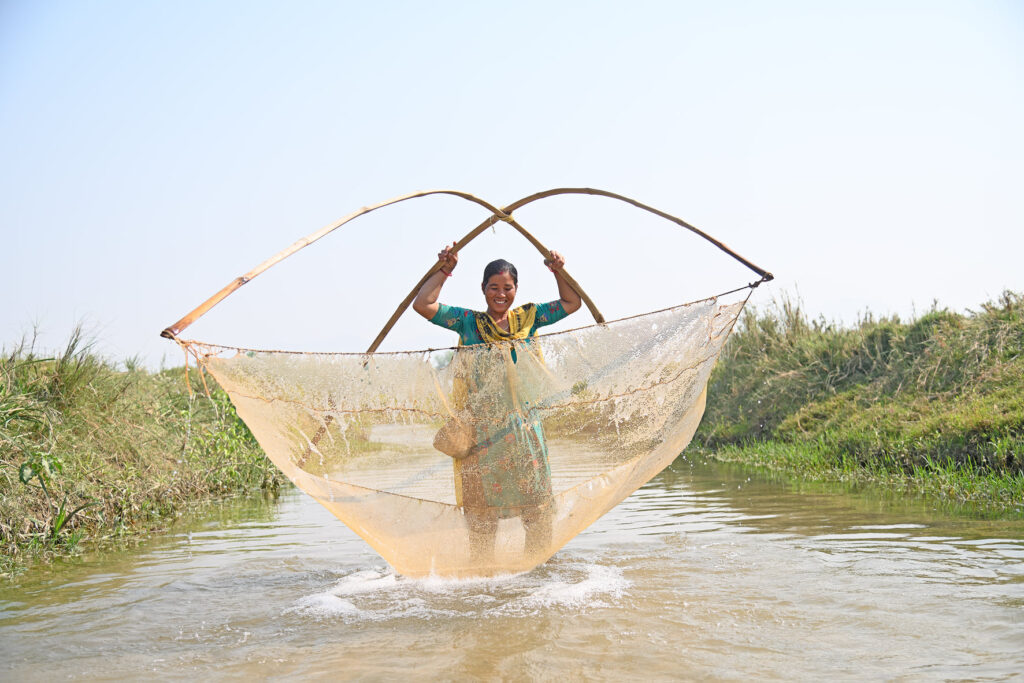
Dhan Kumari Chaudhary Gadhawa 7, Dang
“I was only 5 years old when my mother died of Asthama. I was the eldest of three daughters. One of my sisters was just a toddler and one an infant. I was just a little girl. Although there was some help, I got involved in taking care of them at an early age. Work kept me busy at home. When I turned 8, a lot of my friends and neighbours had already started leaving the village to work as Kamlaris in the neighbouring villages. Some even went to Kathmandu.
My friends would come back home in nice and colourful dresses during Maghi and I aspired for that life. I also wanted to see new towns, live in a different house and enjoy life. But, father was against it. I would get upset with him for not letting me go even though men would visit my home and tell my father of the money I could make. Even though my father disagreed, I had made up my mind. Even though I did not have my father’s consent, I left.
First I went to Ghorahi and then after a year to Kathmandu. I was only 10 and had never seen school. Sometimes I would not understand what was instructed to me. If anyone used even one English word I would be lost. I would feel bad but at the same time, I was happy to have my own room. I remember I was paid 6000 rupees in a year.
When the Kamlari system was abolished, I returned home. Different organizations would come and take us to classes to teach us alphabets and numbers. In these classes, I would feel ashamed because I was the eldest one learning alphabets. I was 18. However, I felt happy that I was able to finally learn something. When I was 18, I was admitted to the 4th grade. I continued and appeared for SLC when I was 24. I got married the same year and left school.
Living at home and now at my husband’s home gave me a sense of community living, family, and villages around. I also get acquainted with the Rapti River. That is when I met with the experts, sirs and madams of the Paani Project. Until then, I did not know about the importance of the Rapti and the aquatic diversity of the river. We caught fish and ate. That is all we did. I did not know about conservation. I did not know about how the environment and humans co-relate for sustainable living. The program taught us all this. They made us aware of the harm we were causing to the river and the living beings in it. With the help of the program, we formed a group called Rawa Aquatic Animal Conservation Group. We are 20 members in the group and our collective goal is to ensure sustainable livelihood through fish conservation. And in doing so we are also conserving the Rapti River.
For generations, fish has been an integral part of our culture. We use it in celebrations and mourning. In happiness and in grief. We use it when someone gets married and when someone dies. Without fish, we also lose a part of our culture. We also came to realize if the fishes were gone due to destructive and overfishing then our culture would be incomplete. This also brought a sense of togetherness amongst us.We started patrolling in the Rapti River for controlling destructive and illegal fishing. The Rapti Rural Municipality also helped us. There are Aquatic Animal and Biodiversity Conservation Act in place by now and destructive fishing is restricted. We distributed posters to aware people of what can be done and what is restricted. Not so long ago people would come with batteries and use current to catch fish. Many would sneak to the banks a poison the water and take away all the fish. Some would even use handmade explosives. I know of two people who died from these ‘explosives’. To be honest, long ago I have used electric current to catch fish. I did not know the damage It was causing.But now things are different. Our group has been successful in stopping these illegal practices. The police have also been very helpful in catching and punishing the culprits. I think our efforts are slowly paying off. Don’t believe me but if you ask around everyone will tell you the Rapti have more fishes than they used to. Just 4 years ago, we all lived in the fear of losing the fishes. Together we corrected our mistakes. That is change and we are proud of the work we are doing here.
All my young life, I worked as a Kamlari but today I am the secretary of our conservation group. I feel proud. There were a time words would not come out of my throat. I was afraid and nervous. But now I can speak. I know my father and mother are both proud. I do not feel so bad anymore for not being able to continue my education. I am making a difference in conservation the way I can, the way I know.”
Dhan Kumari Chaudhary, Gadhawa 7, Dang
Dhan Kumari Chaudhary is the secretary of Rawa CAACG formed with the support from USAID Paani Program in Ghadhawa Rural Municipality, Dang. She played a key role in the conservation of aquatic animals in the Rapti River by controlling illegal fishing practices and promoting sustainable use.


“दमका कारण आमा बित्नुहुँदा म ५ वर्षकी मात्रै थिएँ । तीन दिदीबहिनीहरूमा म जेठी थिएँ । माहिली बहिनी बच्चै थिइन् भने कान्छी त झन् सानै थिइन् । म चैँ अलि ठिकैको बालकै थिएँ । अलिअलि काम सघाउनेहरू भए पनि म नै तिनीहरूलाई सानैदेखि हेर्ने गर्थेँ । कामले गर्दा घरमा सँधै व्यस्त भइन्थ्यो । म ८ वर्षकी हुँदा मेरा धेरै साथीसङ्गीहरू कमलरीको रूपमा काम गर्न छिमेकी गाउँहरूमा जान थालिसकेका थिए । कोहि त काठमाण्डौ नि पुगिसकेका थिए ।माघीमा साथीहरू राम्राराम्रा रंगीचंगी लुगा लगाएर घर आउँथे । अनि मलाई पनि तिनीहरू जस्तै हुन मन लाग्थ्यो । मलाई नि शहर देख्न मन लाग्थ्यो, विभिन्न किसिमका घरहरूमा बस्न मन लाग्थ्यो र जिन्दगीमा म पनि रमाइलो गरूँ भन्ने लाग्थ्यो । तर बुबालाई त्यस्तो मन पर्थेन । मलाई उहाँदेखि नराम्रो लाग्थ्यो । मान्छेहरू घरमा आएर मैले बाहिर कति धेरै पैसा कमाउन सक्छु भनेर उहाँलाई भनिरहन्थे । बुबा नमान्नु भएपनि मैले निर्णय लिएँ । अनि उहाँको स्वीकृती नलिई मैले घर छोडेँ ।सुरूमा म घोराही गएँ, अनि एक वर्षपछि काठमाण्डौ । म १० वर्षकी भइसकेकी थिएँ तर त्यसबेलासम्म मैले स्कुल देखेकी थिइँन । त्यहि भएर मलाई काम लगाउन मालिकहरूले भनेको कुरा कहिले काहिँ त त्यति बुझ्दिन थिएँ । एउटा मात्रै इङ्लिस शब्द बोले भने त झन् म त कहाँ हराउथेँ कहाँ । मलाई नराम्रो लाग्थ्यो । तर म खुसि नै थिएँ । मलाई सम्झना छ, त्यति बेला मलाई वर्षको ६००० रूपैयाँ दिन्थे ।कमलरी प्रथा हटेपछि म घर फर्किएँ । विभिन्न संस्थाहरू आउँथे अनि अक्षर र अंक चिनाउन कलास लिन्थे । म १८ वर्षकी भइसकेकी थिएँ । अन्ततः केहि न केहि पढ्न पाउँदा म खुसि नै थिएँ । म १८ वर्षकी हुँदा मलाई ४ कक्षामा भर्ना गरिदिए । म पढ्दै गएँ, अनि २४ वर्षकी हुँदा मैले बल्ल एस्एलसी दिएँ । त्यहि वर्ष मेरो विहे भयो अनि स्कुल छोड्नुपर्र्यो ।श्रीमानको घरमा बस्दा बल्ल मलाई परिवारमा, सामाजमा र गाउँमा बसेको जस्तो अनुभव भयो । राप्ती नदीसँग पनि म परिचित भएँ । त्यहि बेला पानी परियोजनाको सर, मिस र विज्ञहरूसँग मेरो भेट भयो ।त्यति बेलासम्म मलाई राप्ती र यसको जैविक विविधताको महत्व बारे केहि थाह थिएन । हामी माछा समात्थ्यौँ, खान्थ्यौँ । हामीले त्यत्ति गरेका थियौँ । यसको संरक्षण गर्नुपर्छ भन्ने नै थाह थिएन । दिगो जीवनयापनका लागि मानिस र वातावरण मिल्नु पर्छ भन्ने पनि थाह थिएन । पानी परियोजनाले हामीलाई यि सबै कुरा सिकायो । हामीले खोला र यसमा बस्ने जीवजन्तुहरूलाई कसरी असर पुराइरहेकाछौँ भनेर उहाँहरूले सचते गराउनुभयो । उहाँहरूकै सहयोगमा हामीले रावा जलचर संरक्षण समुह बनायौँ । समुहमा हामी २०जना सदस्यहरू छौँ । माछा संरक्षणबाट हाम्रो दिगो जीवनयापन सुनिश्चित गर्नु नै हाम्रो सामुहिक लक्ष हो । यसो गर्दा हामीले राप्ती नदीको पनि संरक्षण गरिरहेकाछौँ । पुस्तौँपुस्तादेखि माछा नै हाम्रो संस्कृतीको अभिन्न अङ्ग बनेकोछ । चाडपर्व मनाउँदा जोस् कि शोक पर्दा होस्, सुखमा पनि दुःखमा पनि हामी यसको प्रयोग गर्छौँ । कसैको विहे होस् वा कोहि मर्दापर्दा होस्, माछा नै चाहिन्छ । माछा भएन भने त हाम्रो संस्कारको अभिन्न अंग नै गुमाउनुपर्छ । अव्यवस्थितरूपमा माछा मार्न थाल्यौँ भने एकदिन माछा पनि सकिन्छ र हाम्रो संस्कृती पनि अपुरो हुन्छ भन्ने कुरा हामीले महशुस गर्र्यौँ । यसले हामीहरूमा एकताको भावना पनि बिकास गरायो ।राप्तीमा अनाधिकृत र विनाशकारी माछा मार्ने कार्य रोक्न हामीले गस्ती गर्न थाल्यौँ । राप्ती गाउँपालिकाले पनि हामीलाई सहयोग गर्र्यो । अहिले त जलचर तथा जैविक विविधता संरक्षण ऐन पनि आएको छ । अव्यवस्थितरूपमा माछा मार्न रोक लागेको छ । के के गर्न पाइन्छ र के के गर्न पाइँदैन भन्ने बारे बनाइएको पोस्टरहरू हामीले अरूलाई बाँटेकाछौँ । खासै धेरै पनि भएको छैन, यहाँ मानिसहरू बेटरी लिएर आउँथे अनि करेन्ट लगाएर माछा मार्थे । लुकी लुकी पानीमा बिष हालेर सबै माछा मारेर लान्थे । कोहि कोहि त हाते बम नि बड्काउँथे । बम पड्केर २ जना मान्छे मरेको मलाई याद छ । नढाँटी भन्नुपर्दा, मैले नि कुनै बेला करेन्ट लाएर माछा मारेकी थिएँ । त्यसो गर्दा मैले कति क्षति पुराएँ भन्ने ज्ञान थिएन त्यतिखेर मसँग ।अहिले त धेरै कुरा अर्कै भइसकेकोछ । हाम्रो समुहले त्यस्ता अनाधिकृत गतिविधिहरूमा रोक लगाउन सफल भएको छ । गल्ती गर्नेहरूलाई समात्न र सजाय दिन यहाँको पुलिसहरूले नि निकै सहयोग गर्नुभएकोछ । हाम्रो प्रयासले विस्तारै नतिजा दिन थालेको छ ।मलाई विश्वास नगर्नुहोला, तर यहाँ तपाइँले जसलाई सोध्नु भएपनि राप्तीमा पहिलेभन्दा अहिले धेरै माछा पाउन थालेको कुरा जसले पनि भन्छन् । ४ वर्षअघि मात्रै खोलामा सबै माछा सकिएला कि भनेर हामीलाई डर लागेको थियो । सबै मिलेर हामीले हाम्रो गल्ती सच्यायौँ । त्यसैले यहाँ परिवर्तन ल्यायो । हामीले यहाँ जुन काम गर्न सक्यो नि, त्यसप्रति हामी गर्व गर्छौँ । बच्चैदेखि मैले कमलरीको रूपमा काम गरेँ । तर अहिले त म हाम्रो संरक्षण समुहको सचिव भएकिछु । मलाई गर्व लाग्छ । त्यस्ता पनि दिन थिए जब मेरो घाँटीबाट केहि पनि बोली निस्किँदैन थियो । मलाई डर र अप्ठ्यारो लाग्थ्यो। तर अहिले त मज्जाले बोल्न सक्छु । मलाई थाह छ मेरो बुबाआमा नि मदेखि अहिले गर्व गर्नुहुन्छ । पढाई पुरा गर्न नपाएकोमा अहिले त नराम्रो लाग्न पनि छोडेकोछ । मैले जाने जति र गर्न सके जति संरक्षणमा केहि फरक ल्याउन सकिरहेकिछु ।”(धन कुमारी चौधरी, गधवा-७, दाङ )____________धन कुमारी चौधरी रावा सामुदायिक जलचर संक्षरण समुहकी सचिव हुन् । दाङको गधवा गाउँपालिकामा क्रियाशिल उक्त समुहलाई युएस्एड पानी परियोजनाको सहयोग रहेकोछ । अनाधिकृत माछा मार्न रोक लगाई दिगो व्यवस्थापनको प्रवर्द्धन गरेर राप्ती नदीमा जलचर जीवजन्तुहरूको संरक्षण गर्न उनले महत्वपुर्ण भूमिका निर्वाह गरेकिछिन् ।





